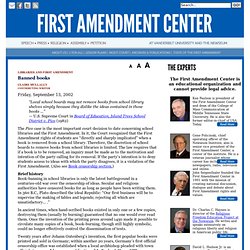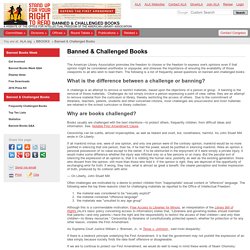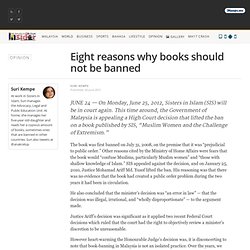

Top 10 Banned Books. Throughout the history of the world, starting with the church, censors have been put on many different things.

The church was able to create a list of banned books, and many of the books were burned. The first list of banned books came from Pope Paul IV who established The Index of Prohibited Books to protect Catholics from controversial ideas. However, authors found ways to get around these censors. Many just published in a nearby country. Whether it is for political reasons, religious reasons, or some other reason, books, to this day, continue to be banned, extremely looked down upon, or challenged harshly. 10. “I see Sofia and I don’t know why she still alive. A novel written by Alice Walker, The Color Purple depicts the life of a young black girl, Celie, who speaks about her life in letters to God. 9. Banned books. Friday, September 13, 2002 “Local school boards may not remove books from school library shelves simply because they dislike the ideas contained in those books …” — U.S.

Supreme Court in Board of Education, Island Trees School District v. Pico (1982) The Pico case is the most important court decision to date concerning school libraries and the First Amendment. In it, the Court recognized that the First Amendment rights of students are “directly and sharply implicated” when a book is removed from a school library.
Brief history Book-banning in school libraries is only the latest battleground in a centuries-old war over the censorship of ideas. In ancient times, when hand-scribed books existed in only one or a few copies, destroying them (usually by burning) guaranteed that no one would ever read them. Censorship followed the European settlers to America. 17 Banned Books You Read As A Child. Banned Book Week: The 7 Most Ridiculous Reasons For Banning Books, 2009-2010. Digg_url = ‘ tweetmeme_url = ‘ tweetmeme_source = ‘comicsalliance'; Since 1982, the last week in September has been observed as Banned Books Week, during which readers are reminded that there are still people out there trying to get books like “Huckleberry Finn” and “The Diary of Anne Frank” — yes, “The Diary of Anne Frank” — banned from schools and libraries.

In the year 2010. Yeah, I know. Comics have been a frequent target of book-banning for decades — as we all learned from Dr. That’s why, in order to show solidarity with the people trying to keep these books — comic and otherwise — from being taken away from readers, I’ve gone through the ALA’s list and picked out their seven most ridiculous reasons in order to do what I do best: Make fun of them for being stupid. Unsurprisingly, “Twilight” books are frequent targets of banning attempts, which pretty much comes with the territory when you’re the most popular books on the market. I may be confusing her with Jay-Z. …yeah, all right. About Banned & Challenged Books. The American Library Association promotes the freedom to choose or the freedom to express one's opinions even if that opinion might be considered unorthodox or unpopular, and stresses the importance of ensuring the availability of those viewpoints to all who wish to read them.

The following is a list of frequently asked questions on banned and challenged books: What is the difference between a challenge or banning? A challenge is an attempt to remove or restrict materials, based upon the objections of a person or group. A banning is the removal of those materials. Challenges do not simply involve a person expressing a point of view; rather, they are an attempt to remove material from the curriculum or library, thereby restricting the access of others. Why are books challenged? Books usually are challenged with the best intentions—to protect others, frequently children, from difficult ideas and information. Should school libraries ban The Hunger Games. Opinion - Suri Kempe - Eight reasons why books should not be banned @ Sun Jun 24 2012.
JUNE 24 — On Monday, June 25, 2012, Sisters in Islam (SIS) will be in court again.

This time around, the Government of Malaysia is appealing a High Court decision that lifted the ban on a book published by SIS, “Muslim Women and the Challenge of Extremism.” The book was first banned on July 31, 2008, on the premise that it was “prejudicial to public order.” Other reasons cited by the Ministry of Home Affairs were fears that the book would “confuse Muslims, particularly Muslim women” and “those with shallow knowledge of Islam.”
SIS appealed against the decision, and on January 25, 2010, Justice Mohamad Ariff Md. Yusof lifted the ban. He also concluded that the minister’s decision was “an error in law” — that the decision was illegal, irrational, and “wholly disproportionate” — to the argument made. However heart-warming the Honourable Judge’s decision was, it is disconcerting to note that book-banning in Malaysia is not an isolated practice. 1. 2. 3. 4. 5. 6.